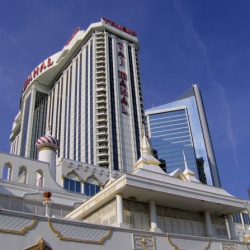The Atlantic City tax liens, which were supposed to draw up to $53 million in cash for the city, instead yielded less than half that total. Only one bidder entered a bid in the auction, Michael Sklar. Mr. Sklar entered a bid on the $22 million in debt owned by the Trump Taj Mahal, so he will now own the debt.
No bid were received on the $31 million in debt owned by the Revel Casino. Revel Casino is the impressive-looking highrise which only opened in 2012, but was closed in September 2014 after its second bankruptcy. The inability to sell off the Revel Casino debt means the city will fall far short of its budgetary goals.
$70 Million Tax Shortfall
Atlantic City has a $70 million revenue shortfall, due to the lost revenues from casinos and lost taxes from the 8,000 laid-off workers. The city had hoped to clear close to $50 million in the auctions, but that would have required someone to see Revel Casino as a good investment.
At present, that simply isn’t the case. With its couple of bankruptcies and its auction still up in the air, people might not feel confident betting on Revel Casino’s owners ever paying back debts. “The city’s obviously disappointed.”
Canceled $140 Million Bond Sale
The earlier bond sale that Mayor Don Guardian cancelled received some criticism from Moody’s, the investment service. Later, Moody’s released a report in which it stated, “Atlantic City’s recently postponed bond sale of $140 million poses significant budgetary, cash flow and balance sheet risk.”
Such reports are a major problem for Atlantic City. Part of its growing problem is the fact that finance companies no longer rate the city’s credit as high. That requires the imaginative funding solutions being used by Atlantic City at present. Guardian announced recently that the city would sell $40 million in bonds before the years end, which should make up the shortfall–but only if the plan nets the amount expected. Too often times in the past couple of years, New Jersey’s leaders have had optimistic ideas about what a moneymaking project might offer.
Other Moneymaking Means Being Considered
The city has other strategies at its disposal to make up shortfalls, but few cities in the United States have a worse credit rating than Atlantic City right now. While short term budgetary shortfalls will need to be met with bonds issues and other expedients, the state of New Jersey might eventually have to step in with relief. One such plan was put forward in September by Senate President Steve Sweeney, who offered $100 million a year if Atlantic City would end their traditional casino monopoly in lieu of a North Jersey casino. This plan was seen as a Trojan horse by most leaders in Atlantic City, who thought the damage to the casino industry would be worse than whatever advantages were being offered.
Under the circumstances, it is no wonder that Mayor Don Guardian refused to give Carl Icahn the tax breaks which Icahn wanted, when Icahn came forward with a plan to keep Trump Taj Mahal open with a $100 million investment. Such a plan would have required the city to offer over $200 million in tax breaks to Trump Taj Mahal, so Mayor Guardian balked at such a plan.
Atlantic City’s casinos are increasingly seen as an albatross, after they were once the centerpiece of the city’s economy. When the casino gambling market changed in the 1990’s and 2000’s, Atlantic City casinos found themselves fighting a losing battle. Pennsylvania and New York each built their own ambient casino industries, which took many of the customers who once traveled to the Boardwalk casinos.
Overall revenues are down almost 50% from 2006 to 2013. Many believe the revenues might drop about about one-third of their 2006 numbers by the time 2014 is added up.

